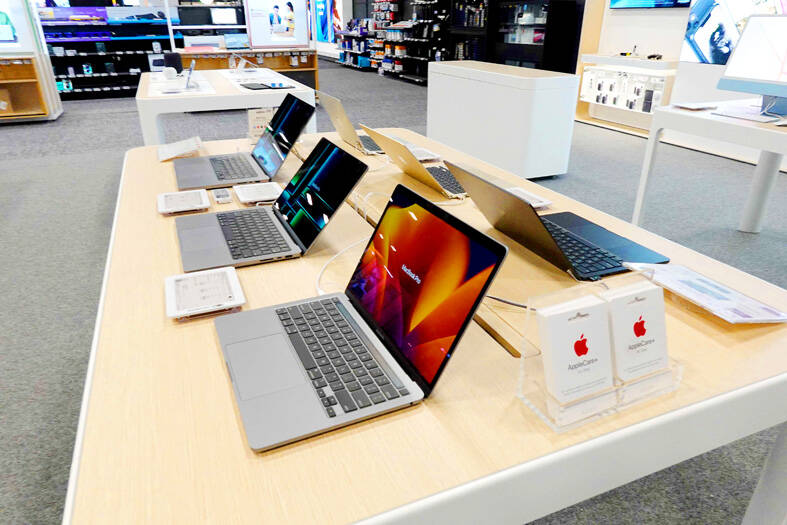Apple Inc is ramping up testing of fresh Macs with processors on a par with the M2 chip, making headway on key new machines that could help reverse a sales decline.
The Mac maker has begun testing the new machines with third-party apps from the App Store to validate their compatibility, according to developer logs shared with Bloomberg News.
That is a necessary step in the run-up to the launch of a new device.

Photo: AFP
Apple is counting on the new machines to entice shoppers after the worst Mac slump since the dot-com bust in 2000.
Shipments plunged more than 40 percent in the first quarter of this year, according to International Data Corp, making the Mac a laggard even in an industry suffering a sharp downturn across the board.
Apple had telegraphed that the quarter would be weak, but it would not provide its actual results for the period until May 4.
Against that backdrop, the new Macs would be a welcome arrival.
The test logs indicate Apple is readying a laptop with processor specifications similar to current models, but with a larger, higher-resolution display.
This model is likely to be the 15-inch MacBook Air that Apple has been planning to introduce this year.
A spokeswoman for Cupertino, California-based Apple declined to comment.
The chip in the new laptop has eight main processing cores and 10 graphics cores, just like the M2. The computer also includes 8 gigabytes of memory, in line with the existing MacBook Air.
The CPU, or main computing processor, continues to be split up between four high-performance cores and four efficiency cores. The Macs in testing are running macOS 14, the version of the Mac operating system that Apple is slated to announce on June 5 at its Worldwide Developers Conference.
Bigger changes to the Mac would come later with the release of an M3 chip, which would represent a transition to a 3-nanometer production process from the current 5-nanometer standard.
The newer chip technology — produced by Taiwan Semiconductor Manufacturing Co (台積電) — allows for improved performance and more efficiency. Apple is to use a similar technology in this year’s new iPhones.
Beyond the larger MacBook Air, the company is working on an update to the 13-inch Air model, the 24-inch iMac and the entry-level 13-inch MacBook Pro. The first Mac Pro using computer’s homegrown chips — known as Apple Silicon — is also in development, but has faced delays and specification changes.

Intel Corp chief executive officer Lip-Bu Tan (陳立武) is expected to meet with Taiwanese suppliers next month in conjunction with the opening of the Computex Taipei trade show, supply chain sources said on Monday. The visit, the first for Tan to Taiwan since assuming his new post last month, would be aimed at enhancing Intel’s ties with suppliers in Taiwan as he attempts to help turn around the struggling US chipmaker, the sources said. Tan is to hold a banquet to celebrate Intel’s 40-year presence in Taiwan before Computex opens on May 20 and invite dozens of Taiwanese suppliers to exchange views

Application-specific integrated circuit designer Faraday Technology Corp (智原) yesterday said that although revenue this quarter would decline 30 percent from last quarter, it retained its full-year forecast of revenue growth of 100 percent. The company attributed the quarterly drop to a slowdown in customers’ production of chips using Faraday’s advanced packaging technology. The company is still confident about its revenue growth this year, given its strong “design-win” — or the projects it won to help customers design their chips, Faraday president Steve Wang (王國雍) told an online earnings conference. “The design-win this year is better than we expected. We believe we will win

Chizuko Kimura has become the first female sushi chef in the world to win a Michelin star, fulfilling a promise she made to her dying husband to continue his legacy. The 54-year-old Japanese chef regained the Michelin star her late husband, Shunei Kimura, won three years ago for their Sushi Shunei restaurant in Paris. For Shunei Kimura, the star was a dream come true. However, the joy was short-lived. He died from cancer just three months later in June 2022. He was 65. The following year, the restaurant in the heart of Montmartre lost its star rating. Chizuko Kimura insisted that the new star is still down

While China’s leaders use their economic and political might to fight US President Donald Trump’s trade war “to the end,” its army of social media soldiers are embarking on a more humorous campaign online. Trump’s tariff blitz has seen Washington and Beijing impose eye-watering duties on imports from the other, fanning a standoff between the economic superpowers that has sparked global recession fears and sent markets into a tailspin. Trump says his policy is a response to years of being “ripped off” by other countries and aims to bring manufacturing to the US, forcing companies to employ US workers. However, China’s online warriors